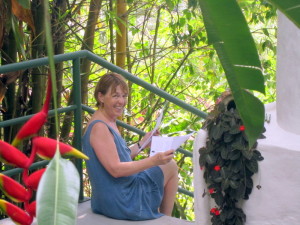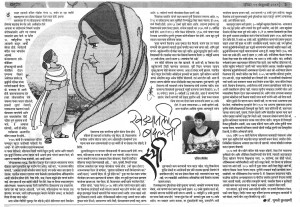- the need to involve men as equal partners – so married couples are trained together and work together to counsel women
- the importance of girls’ education, but also of meaningful employment
- the empowering feeling women get from rewarding employment and recognition by their fellow villagers
- opening up the ‘black box’ of discussion on sexual topics and giving women the tools to choose their paths to reproductive wellbeing
- creating scope for other birth control methods (and thus for child spacing) beyond sterilization, the main method used in rural India
- emphasizing the need to value girls as much as boys and open the door to son preference reduction!
Reaching one million jobs for Indian women in “the last mile”
“Women on Wings” aims to create one million jobs for Indian women by 2018. And according to Ronald van het Hof, Managing Director, India, it is on track to meet its goal. The organization has fuelled 101,250 new jobs since its beginning in 2007, through partnering with Indian businesses that share its vision but lack the relevant business know-how.
I visited Ronald on March 11 at his home office on the 6th floor of a tall apartment tower in Gurgaon, a mushrooming urban industrial centre, 28 km. from New Delhi. Women on Wings was created by two visionaries, Maria van der Heijden and Ellen Tacoma from the Netherlands, both with strong marketing, communication and change management backgrounds and experience in India.
To Change India’s Preference for Sons, Start With the Women
Pre-trip Butterflies – and I don`t mean Morphos!
Greetings from in Manuel Antonio, Costa Rica, where I have been living since 2006. This place is full of beautiful butterflies, including my favorite, the morpho.  Whenever I see it fly by I feel it is going to be a good day! But what I’m writing about today are a different kind of butterflies, butterflies in my stomach about my book launch in India, coming right up! On March 10 at India 2020, Vision for the Financial Sector, my launch will take place in the inaugural session, followed by a fairly heavy schedule of speaking engagements. My butterflies are purely physical – how will the trip go? Will I be jet-lagged and fall asleep on the podium? How will people react to my findings and recommendations? I always worry about what the Indian demographers – who can be super critical – will say! Will I remember how to speak Marathi when I get to Maharashtra? Will my Indian clothes be laughably out of date? And most important, will the villagers in Gove, the subjects of my book, like it?
Whenever I see it fly by I feel it is going to be a good day! But what I’m writing about today are a different kind of butterflies, butterflies in my stomach about my book launch in India, coming right up! On March 10 at India 2020, Vision for the Financial Sector, my launch will take place in the inaugural session, followed by a fairly heavy schedule of speaking engagements. My butterflies are purely physical – how will the trip go? Will I be jet-lagged and fall asleep on the podium? How will people react to my findings and recommendations? I always worry about what the Indian demographers – who can be super critical – will say! Will I remember how to speak Marathi when I get to Maharashtra? Will my Indian clothes be laughably out of date? And most important, will the villagers in Gove, the subjects of my book, like it?
More to come, and thanks for reading.
Rural Women in Transition
By Dr. Sumati Kulkarni
Originally published in LOKASATTA, 19th Feb.2011, Saturday Supplement ‘Chaturang’
Carol Vlassof from Canada has been coming and staying in a small village in Maharashtra every ten years during the last 35 years. During her stay she has been following the changes taking place in the life of women in that village. Recently she came to present the findings of her research to the researchers in India and in the gramsabha of that village. During her visit, we were going down the memory lane. I still remember Carol as she was 35 years back. She had come to work for Ph. D. under the guidance of Prof. Kumudini Dandekar of Gokhle Institute Pune, under Shastri fellowship programme of the Indo-Canadian Institute of Canada. I still remember Carol, staying in the Gove village (with a population of about 2000, near Satara), wearing traditional irkal saree and speaking Marathi with rustic accent. She used to tell us how she goes to the river for washing clothes along with other women- –so this was our Carol at that time.
Carol is Featured in this issue of Quepolandia Magazine
Carol has been featured in the February 2014 issue of Quepolandia magazine. Read the article online HERE.
Create jobs, disposable income for rural women, urges expert
The India Express. 10 December 2013
 A study of a rural Indian village called Gove in Satara district of Maharashtra, spanning over 30 years (from 1975 to 2008), has revealed that funding for family planning, health and education programmes has made great strides. But the final step — creating jobs and disposable income for rural women — has not achieved any significant success.
A study of a rural Indian village called Gove in Satara district of Maharashtra, spanning over 30 years (from 1975 to 2008), has revealed that funding for family planning, health and education programmes has made great strides. But the final step — creating jobs and disposable income for rural women — has not achieved any significant success.
Demographer and women’s health specialist Dr Carol Vlassoff, in a new book, Gender Equality and Inequality in Rural India. Blessed with a Son, has published the results of the study and said that aid donors to India are going down the wrong path when it comes to bringing millions of rural women into the modern economy.


















 Keep reading…
Keep reading…
